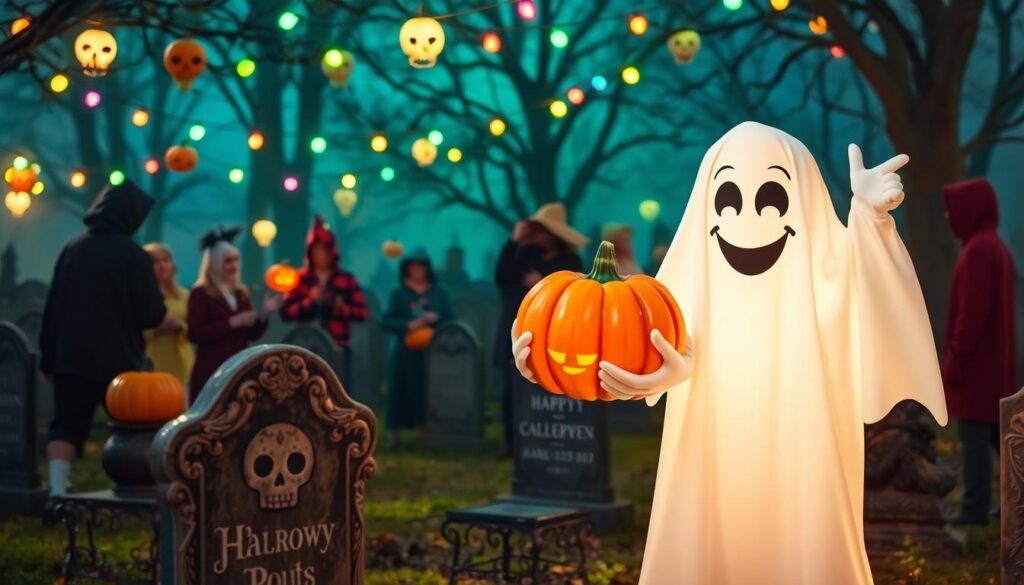Are you dying to add some humor to your Halloween parties or spooky gatherings? We’ve dug up the best grave puns that’ll have everyone laughing until they’re dead tired. These bone-chilling wordplays aren’t just fun—they’re to die for!
We know that finding the perfect pun can be a grave matter. That’s why we’ve unearthed a collection of cemetery jokes and tombstone one-liners that strike the perfect balance between macabre and mirthful. From skeleton puns to funeral humor, our comprehensive list has something for every mortician-in-training and Halloween enthusiast.
10 Deadly Hilarious Grave Puns That Will Have You Dying of Laughter
- I’m digging these cemetery jokes – They’re groundbreaking in the industry of humor! Graveyards provide fertile soil for wordplay that’s both morbid and mirthful. Everyone appreciates a well-crafted pun that unearths laughter in unexpected places.
- That funeral was so expensive, it’s a plot to bankrupt us – Cemetery real estate isn’t cheap these days! Burial costs have skyrocketed, making this pun particularly relevant for anyone who’s experienced sticker shock when planning final arrangements.
- Gravediggers are the last ones to let you down – Talk about reliable service in your final moments! These professionals take their responsibility seriously, ensuring you’re comfortably settled in your eternal resting place.
- I’m dead serious about these tombstone puns – No bones about it, grave humor requires commitment! When delivered with the right deadpan expression, these jokes hit their mark every time.
- The cemetery raised its burial fees, so the costs are going up while bodies are going down – Economics affects everything, even the afterlife! Inflation has certainly not spared the funeral industry, creating this perfect opportunity for financially morbid wordplay.
- Working at a cemetery is a grave responsibility – Maintaining these sacred grounds requires dedicated professionals! Caretakers must balance respect for the deceased with practical maintenance, truly a job that’s both solemn and essential.
- People are dying to get into this cemetery – It’s the most exclusive underground club in town! With limited space available, some historic cemeteries actually have waiting lists, making this pun eerily accurate.
- That headstone salesman has a monument-al ego – He’s set in stone about his selling abilities! Funeral industry professionals sometimes develop unique personalities after years in the business, making them perfect subjects for humorous observations.
- Why don’t ghosts use elevators? They lift their spirits! – Phantoms prefer taking the stairs for ethereal exercise! This supernatural wordplay connects the ghostly area with everyday objects, creating an unexpected collision of concepts.
- The skeleton couldn’t help being late—he had to bone up on his assignments – Academic pressure affects everyone, even the deceased! Educational puns mixed with skeletal imagery create a surprisingly relatable joke that works in both classroom and cemetery settings.
The Tomb-foolery: Understanding Why Grave Puns Are Oddly Satisfying

The Psychology Behind Dark Humor
Dark humor, particularly grave puns, serves a deeper psychological purpose than just making us laugh. We often find cemetery jokes oddly satisfying because they allow us to confront mortality in a controlled, less threatening way. These puns create emotional distance from death’s gravity through clever wordplay. Research suggests that embracing this type of humor actually helps people process difficult emotions and reduce anxiety around taboo subjects. The juxtaposition between the seriousness of death and the lightness of a pun creates a cognitive release that many find cathartic. Our brains experience a pleasant surprise when the expected solemnity of death-related topics transforms into something playful and unexpected.
Historical Examples of Cemetery Comedy
Cemetery humor has deep historical roots dating back centuries. Shakespeare masterfully employed grave puns in many of his works, with a notable example appearing in “Romeo and Juliet” when Mercutio, after being fatally stabbed, declares, “Ask for me tomorrow, and you shall find me a grave man.” This brilliant wordplay connects his serious condition with his imminent burial. Tombstone inscriptions throughout the 18th and 19th centuries often featured witty epitaphs that demonstrated this tradition continued long after Shakespeare’s time. Famous authors like Mark Twain regularly incorporated death-related wordplay in their writings, showing the enduring appeal of mixing morbidity with mirth. These historical examples demonstrate that humans have long used linguistic cleverness to cope with mortality, proving our current enjoyment of grave puns continues a time-honored tradition of finding humor in the ultimate human experience.
Six Feet Under-rated: Puns About Burial and Graves

Grave puns represent a distinctive form of humor that revolves around burial practices and cemetery settings. This macabre wordplay often incorporates clever references to death, graves, and skeletal remains while maintaining a lighthearted tone.
Classic Headstone Humor
Classic headstone humor taps into the unexpected juxtaposition of solemnity and wit. These cemetery-based jokes typically play on words associated with burial traditions. For instance, “The cemetery was crowded; everyone had their time and place” highlights the inevitable destiny we all share while adding a humorous twist. Grave digger puns also fall into this category, with quips like “The grave digger loved his work; it was his true calling” blending occupational dedication with afterlife references. Skeleton jokes round out this ghoulish genre, offering lines such as “Skeletons prefer online shopping since they despise dressing rooms” – combining modern activities with bony predicaments.
Punny Epitaphs That Actually Exist
While genuinely humorous epitaphs are relatively rare in actual cemeteries, the concept of incorporating wordplay into final farewells remains intriguing. Literary examples provide us with famous instances of grave humor, such as Shakespeare’s clever line delivered by Mercutio in “Romeo & Juliet”: “Ask for me tomorrow, and you shall find me a grave man.” This brilliant double meaning of “grave” – referring to both seriousness and death – exemplifies the potential for linguistic creativity even in mortality. Though documented cases of real punny headstones are limited, the idea reflects a touching desire to commemorate loved ones with personality and lightness rather than strict solemnity. These witty epitaphs serve as lasting testaments to human creativity and our ability to find humor even when facing life’s most serious transition.
Rest in Pun-derful Peace: Afterlife and Ghost Jokes

When it comes to supernatural humor, nothing beats a good afterlife joke. We’ve compiled some of the most hauntingly hilarious puns about ghosts and the great beyond that are guaranteed to raise your spirits.
Spirited One-Liners
Graveyards are actually quite popular destinations because people are literally dying to get in. Those who make coffins for a living often joke that they have the ultimate dead-end job, though they rarely complain about business being slow. Ghosts have earned their reputation as excellent comedians, mainly because they always deliver a killer punchline that leaves audiences in stitches. One transparent ghost became quite distressed when he couldn’t locate his friend at the cemetery, feeling completely see-through without his companion. Even though being buried in his work, the local grave digger maintains an impressive sense of humor, proving that even the most somber professions can find joy in the macabre.
Ghost-to-Ghost Communication Jokes
Spectral networking takes many forms in the afterlife, with ghosts developing unique ways to stay connected. They don’t need phones or internet—they simply engage in some good old-fashioned ghost-to-ghost communication. Parties in the spirit area are reportedly quite entertaining, with attendees frequently praising each other’s absolutely killer sense of humor. Financial discussions among the deceased often revolve around “crypt o’ currency,” which serves as the preferred monetary system beyond the grave. Visitors to cemeteries frequently wonder why these supposedly peaceful places are surprisingly noisy—the answer lies in all the coffin happening around the grounds. Many undertakers eventually seek alternative employment opportunities, citing the funeral parlor business as too much of a dead end for their career aspirations.
Grave Situations: Funeral Director and Mortician Puns

Funeral professionals have developed a unique brand of humor to navigate the solemn nature of their work. These industry insiders rely on specialized terminology and workplace experiences to create puns that simultaneously lighten the mood and acknowledge the gravity of their profession.
Professional Death Care Wordplay
Funeral directors often joke about their job security with lines like “People are dying to see me” – a reflection of the industry’s steady demand. Work schedule humor abounds among morticians, with many lamenting their “graveyard shifts” that strain relationships. Transportation quips are particularly popular, as in “How does a mortician commute to work? By hearse, of course!” These puns serve as coping mechanisms for professionals who face mortality daily. Morticians also track their appointments in what they jokingly call their “deadline books,” showcasing how industry terminology naturally lends itself to wordplay. The profession’s unusual stability even inspires jokes about client feedback – “Our customers never complain!”
Embalming and Preparation Quips
Tool-based humor represents a important category of mortician puns, with many naming the “organ” as their favorite instrument to work with. Process-oriented jokes include bringing flashlights to ensure the deceased “saw the light” one final time. Skilled embalmers earn recognition from colleagues for their “killer sense of humor” while working. Coffin-related puns remain staples in funeral homes, with staff members getting “kicked out of meetings for not being able to stop coffin.” Urn references appear in professional greetings, with morticians addressing each other “Urnestly” when discussing cremation options. Music preferences don’t escape the punning either, with funeral directors claiming their favorite genre is “De-compose” music – a specialty unlikely to climb the charts anytime soon.
Dying to Tell You: Delivering Grave Puns Without Killing the Mood

Reading the Room Before Dropping Death Jokes
Timing is everything when it comes to grave humor, especially in potentially sensitive environments. We recommend using death-related puns only in low-stakes, non-crisis settings to avoid causing offense or emotional distress. Audience awareness plays a crucial role in determining whether your puns will land as humorous or insensitive. Consider the emotional state of your listeners and their personal experiences with loss before unleashing your repertoire of cemetery wordplay. Familiarity with your audience also helps determine if they share the cultural and linguistic understanding necessary to appreciate the humor without misinterpretation. Remember that repeated exposure to the same puns diminishes their comedic impact, as research shows that familiarity reduces the element of surprise that makes humor effective.
When Grave Humor Helps With Grief
Gallows humor, including death-related puns, serves as a powerful psychological coping mechanism in stressful situations. We’ve observed that dark humor allows individuals to momentarily distance themselves from fear or grief, creating much-needed psychological relief during difficult times. This type of wordplay requires both hemispheres of the brain to process effectively, as they resolve semantic incongruity in a way that can bring comfort. Shared laughter through morbid jokes fosters bonding among those experiencing collective grief, creating connections through communal emotional release. Family settings can particularly benefit from gentle death-related wordplay, as it aids in processing complex emotions while encouraging creative thinking about difficult subjects. Studies suggest this approach helps normalize discussions about mortality in a non-threatening manner, though effectiveness always depends on context and the exact sensitivities of those involved.
How to Craft Your Own Tombstone Tearjerkers

Ready to create your own grave humor that leaves people in stitches? We’ve compiled expert techniques for crafting memorable tombstone tearjerkers that balance wit and taste.
Wordplay Techniques for Death-related Humor
Puns on common phrases offer endless possibilities for tombstone humor. Try twisting familiar expressions into death-related jokes like “Rest in pieces” or “He was a grave disappointment.” These clever modifications take ordinary sayings and transform them into memorable epitaphs with minimal effort.
Professional connections make for especially amusing tombstone inscriptions. Link the deceased’s occupation to their final rest with quips such as “Here lies a musician. He had perfect pitch” or “Here lies a gardener. She grew on us.” This personalized approach honors someone’s life work while adding a touch of humor.
Well-known sayings can be reimagined with a morbid twist for surprisingly funny results. Consider phrases like “She took a dirt nap and loved it!” which play on common expressions while acknowledging the finality of death. These twisted sayings work because they combine the familiar with the unexpected.
Turning Morbidity Into Comedy Gold
Irony and wit serve as powerful tools when crafting tombstone humor. Highlight unexpected twists or situational irony with lines like “She always said her feet were killing her, but no one believed her.” These jokes acknowledge life’s contradictions while finding humor in the inevitable.
Satire and parody add dimension to gravestone inscriptions. Using techniques that gently mock death’s solemnity can create memorable epitaphs. Simple responses like “She answered” or playful takes on religious traditions demonstrate how even serious subjects can become sources of levity.
Personalization makes tombstone humor more meaningful and impactful. Tailor your jokes to reflect the personality, interests, or notable characteristics of the person being memorialized. This thoughtful approach ensures the humor resonates authentically rather than feeling generic or forced.
Double meanings and clever wordplay create the most sophisticated tombstone humor. Epitaphs like “Gone away, Owin’ more than he could pay” or “He is not here, there’s only the pod: Pease shelled out and went to God” showcase how layered meanings can transform a simple statement into something truly memorable. These examples demonstrate how originality and creativity result in epitaphs that stand the test of time.
When Grave Puns Go Viral: Cemetery Humor in Pop Culture

Grave humor has found new life in the digital age, spreading across platforms and bringing laughter to traditionally somber topics. The intersection of death-related wordplay and internet culture has created a perfect storm for viral content that resonates with audiences seeking both humor and a way to process mortality.
Famous Movie and TV Show Cemetery Jokes
While exact examples from films or TV shows aren’t extensively documented in recent viral trends, cemetery humor frequently appears in classic horror-comedy franchises. Beetlejuice and The Addams Family embrace macabre comedy through skeleton jokes like “Nothing got under his skin!” and ghost-related wordplay. These productions masterfully balance dark themes with lighthearted delivery, creating memorable moments that have influenced how we approach death-related humor. Movie and television writers often incorporate these jokes to break tension in otherwise frightening scenes, demonstrating how grave humor serves both entertainment and psychological purposes.
Social Media’s Obsession With Death Humor
TikTok has become ground zero for cemetery humor’s digital renaissance, with creators like @ghostlyarchive and @hillbillybonz amassing thousands of likes. Popular hashtags like #cemeterytiktok and #punstoppable showcase creators leveraging morbid settings for comedic effect. Videos featuring lines such as “The cemetery is dying for new visitors” or “I told my friend a grave pun, but he didn’t dig it” resonate broadly across demographics. Short-form content thrives on these quick-hit jokes that play with double meanings of death-related terms. Seasonal content spikes around Halloween, when “coffin sales” and “ghost town” references dominate feeds. Cemetery backdrops transform traditional spaces of mourning into stages for communal laughter, reflecting a cultural shift in how we engage with mortality online. These creators blend dad jokes with spooky visuals, capitalizing on the juxtaposition between lightheartedness and macabre themes.
Conclusion: The Immortality of Grave Puns in Comedy
Grave puns have carved out their eternal place in the industry of comedy. They offer us a unique way to confront our mortality through laughter while creating bonds with others who share our dark sense of humor.
Whether you’re livening up a Halloween party dropping a one-liner during a funeral industry conference or crafting a memorable epitaph these jokes continue to remind us that humor can be found even in life’s most certain outcome.
We hope our collection of cemetery wordplay has both entertained and inspired you to create your own punny perspectives on mortality. After all when it comes to grave humor the possibilities are never dead and buried—they’re immortal.
Frequently Asked Questions
Why do people use grave puns at Halloween parties?
Grave puns and cemetery jokes offer a way to blend macabre themes with humor, making Halloween gatherings more entertaining. They provide a lighthearted approach to typically somber subjects, helping people confront mortality in a less threatening way. This kind of dark humor creates emotional distance through wordplay and helps reduce anxiety around taboo subjects while adding a unique element of fun to spooky celebrations.
Are cemetery jokes appropriate for all audiences?
No, cemetery jokes aren’t appropriate for all audiences. Timing and audience awareness are crucial when delivering grave puns. They work best in low-stakes environments where people are receptive to dark humor. Avoid using them in situations where people are actively grieving or might find them offensive. Always assess the emotional state of your audience and adjust accordingly.
What makes a good grave pun?
A good grave pun combines clever wordplay with death-related themes while maintaining a lighthearted tone. The best ones use irony, satire, or unexpected twists on common phrases. Personalization (relating to a specific occupation or personality trait) can make them more memorable. Originality and creativity are key—the pun should surprise the listener and provoke laughter rather than discomfort.
How can I create my own tombstone humor?
Create your own tombstone humor by twisting common phrases into death-related jokes. Start with familiar sayings and add an unexpected mortuary spin. Incorporate wordplay techniques like homophones, puns, or double meanings. Consider personalizing jokes based on occupations or hobbies. Remember that irony and clever wordplay are especially effective, and aim for originality to make your humor memorable.
Do funeral professionals really use dark humor?
Yes, funeral professionals commonly use dark humor as a coping mechanism. They create specialized puns about job security, work schedules, and industry-specific tools to lighten the mood while acknowledging the gravity of their work. This gallows humor helps them distance themselves emotionally from the constant exposure to mortality and creates bonds among colleagues. It’s a psychological strategy that helps them manage the emotional demands of their profession.
What’s the history behind cemetery comedy?
Cemetery comedy has deep historical roots dating back centuries. Shakespeare frequently employed death-related wordplay, as seen in the grave-digger scene in Hamlet and the clever puns in Romeo & Juliet. This tradition of mixing morbidity with mirth has endured throughout literary history, demonstrating humanity’s consistent use of humor as a tool to process mortality. This longstanding tradition shows how finding humor in death has helped people cope with life’s ultimate certainty.
How has social media affected grave humor?
Social media has revitalized grave humor, particularly on platforms like TikTok where creators share cemetery jokes with wide audiences. Hashtags like #cemeterytiktok have created communities around this type of content, transforming traditional spaces of mourning into stages for communal laughter. The digital age has expanded the reach of this humor, allowing people to connect over these taboo subjects in new ways and bringing fresh perspectives to age-old themes.
Can grave humor help with grief?
Yes, grave humor can serve as a psychological coping mechanism during grief. Gallows humor allows individuals to distance themselves emotionally from painful realities and can foster connections through shared laughter. It helps normalize discussions about mortality and can provide momentary relief from grief’s heaviness. However, it’s important to be sensitive to timing—humor should be introduced only when the grieving person is emotionally ready.







